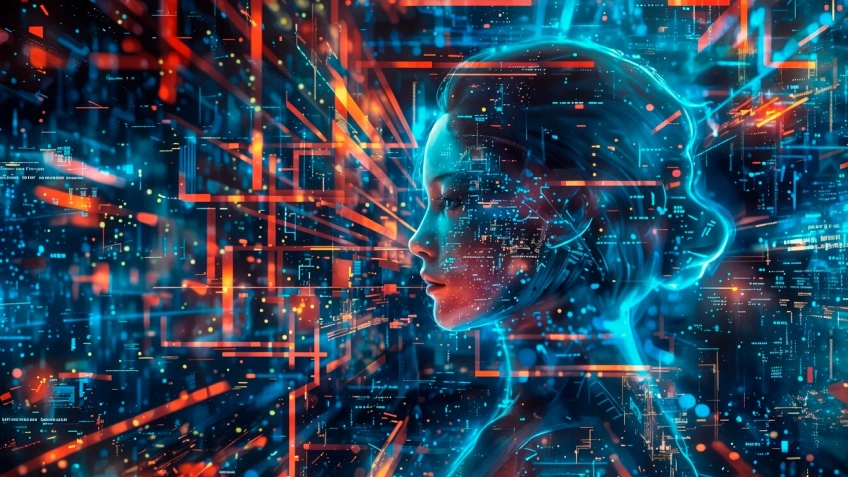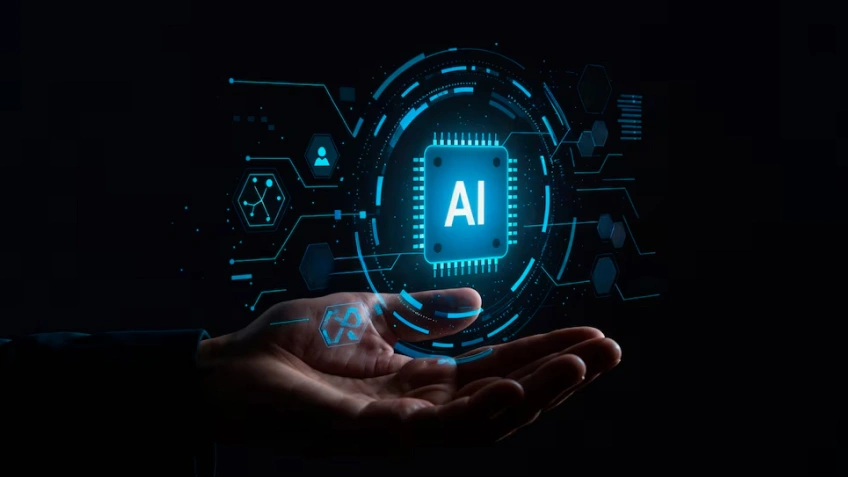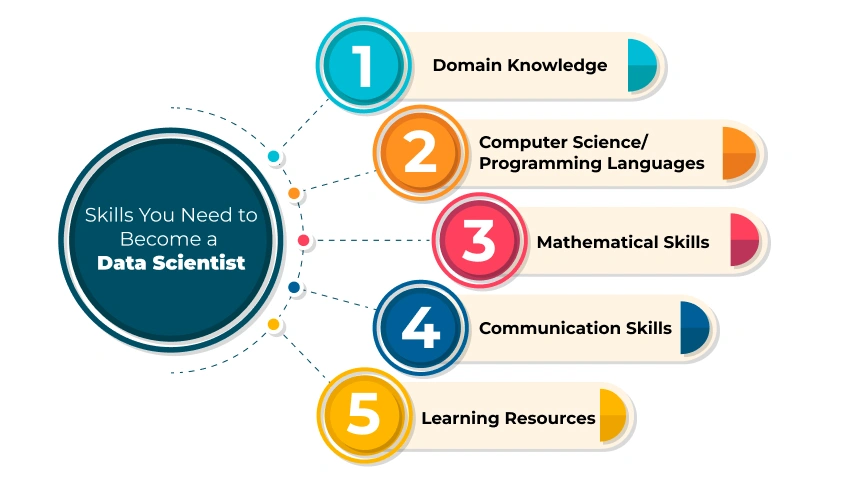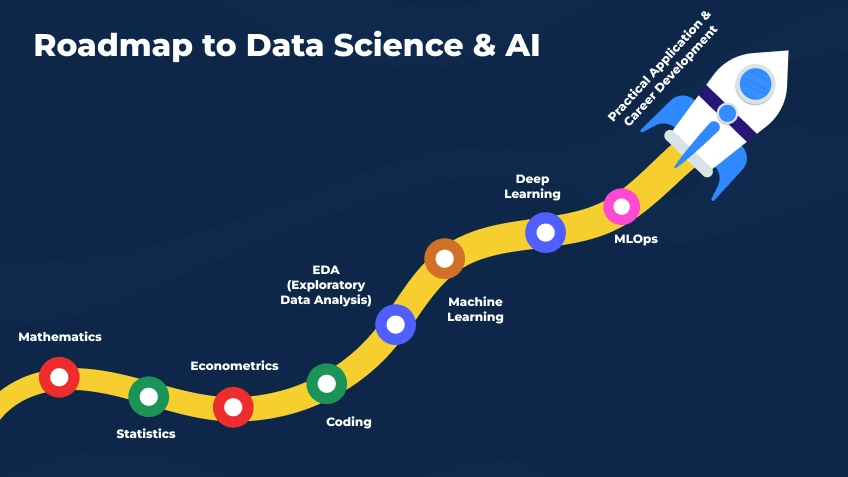By Tanmay Das

Whether you are a student, a professional seeking a career transition, or an aspiring data scientist, you need to follow the right path to reach your desired goal. Which isn’t easy!
This is why we are here to help you with this blog, serving as your data science roadmap for 2025. Check it out and build a flourishing career in this thriving industry!
Data scientist roles are forecasted to grow by 36% between 2023 and 2033 globally, this pace is considerably quicker than the average for all occupations.
But!
What is the scope of data science in India?
The Indian data analytics market, valued at $3,551.8 million in 2024, is expected to surge to $21,286.4 million by 2030, driven by a strong growth trajectory.
This figure clearly illustrates that data science in India has a promising future. This powerful growth indicates an opportunity-filled and favourable career for aspiring data science professionals.
However, to carve a career in this field, you need a clear path that leads you to success. This is where the top data science AI course comes into play. This blog is your data science roadmap for 2025, guiding you through fundamental concepts, necessary tools, and more that you need to master this field. But first, let’s understand the basics of data science and AI (artificial intelligence)
2025 is dramatically shaping the technological landscape with data science and AI (artificial intelligence). As the volume of data is exploding, the demand for skilled professionals is escalating rapidly. Before diving into these fields, you should understand what it exactly means.

Data science is a versatile field used to extract knowledge and valuable insights from both structured and unstructured data with the help of scientific methods, algorithms, processes, and systems.
Data scientists leverage various tools and techniques to:

AI, or artificial intelligence, is a broader field which primarily focuses on creating computer programs and machines that are capable of performing various tasks that require human intelligence. This includes:
Simply put, data science is all about extracting valuable information from sets of data, and AI is about building smart systems capable of performing human-like tasks.

You must have already seen the incredible impact of Data science and AI in 2025. This cutting-edge technology is driving innovation and valuable insights across numerous industries.
Let’s get down to the key skills you need to become a data scientist.
Having a good understanding of the specific field or industry you will be working with, such as healthcare, marketing, finance, etc., is crucial. This knowledge helps you identify the right problems, understand the data limitations and context, and ensure that your solutions are actionable for businesses.
This includes your programming abilities to handle, process, analyse, and model data using data science programming languages like Python, R, and tools like SQL. This also involves knowing computational concepts like data structures and algorithms, which are necessary for creating data pipelines and implementing models.
Having a solid foundation in areas like Linear Algebra, Calculus, Probability, and Statistics is important. These skills provide you with a theoretical foundation for understanding how machine algorithms work, quantify uncertainty, interpret statistical results, and build deep knowledge of data and models.
You should be able to clearly explain complex data findings and technical concepts easily to both non-technical and technical stakeholders, as well as your colleagues. Effective communication skills, including data storytelling and visualisation, help people understand, trust, and make decisions from your insights.
You can acquire the aforementioned skills through many resources, including a data science AI course. Our full-stack data science with GenAI & ML course offers a structured curriculum with a good balance of theory and practical projects. You can acquire hands-on skills in this field and become an expert data scientist in 6 months.

To attain proficiency as a data scientist, you need a strong command of numerous disciplines, starting with foundational math and extending to advanced machine learning. The below-mentioned list is your data science roadmap that highlights key areas you need to explore in your journey to data science AI courses.
Knowledge of mathematics builds a bedrock for understanding algorithms and models in data science and AI.
In-depth statistics knowledge provides tools for understanding data distribution, evaluating the performance of models, drawing inferences, etc.
The econometrics field applies statistical methods to economic data, which offers key methods to analyse connections and predict future trends.
Having a strong foundation in programming is critical for data manipulation, analysis, and modelling.
EDA, or exploratory data analysis, is another crucial step that includes understanding the data through statistical summaries and visualisation.
ML, or machine learning, is the engine of AI. It empowers systems to learn patterns, make predictions, and enhance their performance, based on data.
Deep learning is a branch of machine learning that uses AI neural networks with multiple layers to learn complex patterns from large datasets.
MLOps, or machine learning operations, focuses on the practical factors of deploying and maintaining ML models in real-world applications.
This step involves putting your theoretical knowledge into practice, which is crucial in a data science and AI course.
The data science and AI field offers numerous career opportunities in 2025 and beyond.
From foundational knowledge to advanced techniques and practical application, this data science roadmap outlined the critical steps that will greatly help you in your career.
The present is data-driven, and the future is expected to be more analytics-driven. With a focused approach and consistent hard work, you can become a data scientist with expertise in AI.
Remember, you need to choose the right institute to start your learning journey. You can check out this link to choose the best data institute in Kolkata.
Our 6-month blended program can help you pave your way to becoming an expert data scientist.
So, don’t wait anymore. Contact us today: 9836 423 755/ 6289 562 294 to take the first right step towards a lucrative data science career!
What is the future of data science in 2025?
Data science is expected to be leveraged and implemented in more industries with more focus on specialised applications like real-time analytics and explainable AI. The need for skilled data scientists will remain significant.
What is the scope of AI in 2025?
AI is projected to see wider adoption in automation, solving complex challenges, personalised experiences, and intelligent systems. You will see advancements in fields like computer vision, NLP, robotics, etc.
What is the roadmap for data science AI courses?
Data science roadmap for AI courses begins with foundational mathematics, programming, statistics, and advances to data analysis, deep learning, machine learning, and specialised AI applications. Remember, working on practical projects is crucial to building a strong foundation in these fields.
Will AI replace data science jobs?
AI is expected to automate various human tasks, but it is likely to augment their roles, not replace them. Data scientists will remain in demand for solving complex problems and extracting strategic insights.
Which is the best artificial intelligence and data science course?
The best artificial intelligence and data science course for your career depends on your goals, prior knowledge, and educational background. You need to look for courses that offer industry-relevant projects, a comprehensive curriculum, career support, and experienced instructors like Karmick Institute’s data science with GenAI & ML program.
How to learn AI in 2025?
You can start with learning a programming language like Python, statistics, and mathematics. After that, move to AI fundamentals, machine learning, deep learning, hands-on projects, and consistent practice.
Which is the most in-demand AI career?
Roles like machine learning engineer, natural language processing engineer, AI scientist, and computer vision engineer are highly demanded across various domains.
Is data science worth in 2025?
Absolutely! Data science is worth it in 2025 and beyond, driven by its growing applications. Due to the increasing volume of data, there will be a strong demand for data scientists across various sectors in 2025 and in the coming future.
What skills does a data scientist need?
Data scientists need to possess essential skills, including programming (Python), machine learning, statistics, data visualisation, data wrangling, communication, and domain knowledge.
How long does it take to become a data scientist?
Becoming a data scientist depends on several factors, including educational background, prior knowledge, grasping power, mode of learning, data science AI course curriculum, etc. However, you can expect to master this field between 6 months to a few years.
Read more blogs: